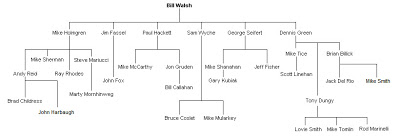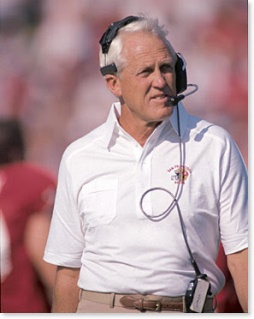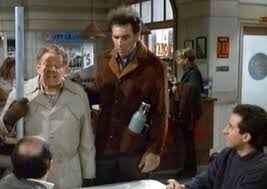Seriously? I have to actually argue this point to anyone? This kind of bums me out.
It started simply enough, with Peter King of Sports Illustrated tweeting a response to the following question:
RT @: Where does Bill Walsh rank among your top HC? … Easily top 10. Probably top 5.
Because I am completely in the tank for my San Francisco 49ers, but also because I know at least a little about football, I hastily responded back to King:
@ Bill Walsh is PROBABLY a top-5 all time HC? Dare you to name five better, both on field and league impact. Cant do it.
Yes, I’m a football dork and kind of an a-hole, but you knew that already. For whatever reason, King chose to respond back, not really answering my question but putting into his Twitter stream, which produced a HUGE amount of responses to me. Some folks agreed with me, while others provided their list of five coaches they’d rank above Bill Walsh. It’s true that there are clearly some other names that belong on that list, but it was the folks suggesting insane replacement names that got me thinking two things:
1) I can’t imagine the inanities that Peter King and others get in their inboxes, twitter streams, etc., on a daily basis.
2) I guess I have to make the argument that Walsh is an easy choice for top-five all-time as a NFL Head Coach.
Let’s get the sheer statistics out of the way first. Bill Walsh coached from 1979-1988, ten full seasons in the NFL. Like most coaches, he inherited a bad team — and he still averaged 9.2 wins a season for those ten years. Let’s break it down – here is how he ended a ten-year run:
- Overall Record: 102-63-1
- Regular Season Record: 92-59-1
- Playoff Record: 10-4
- NFC West Division Titles: 6
- NFC Championships: 3
- Super Bowl Wins: 3
In 60% of the seasons Bill Walsh coached, he won the division, and in half of those he won the Super Bowl. He built an incredibly talented team and coached the hell out of them, year after year. The franchise went from being irrelevant to a true dynasty, winning 10 or more games in sixteen consecutive seasons and collecting five Super Bowls along the way. Those are feats not likely to ever be replicated.
But wait, you say — those last two Super Bowls were won by
George Seifert, not Walsh. True! And while many treat Seifert as a Barry Switzer-type, falling head first into a Super Bowl ring or two, I’m not one of those – he did well with what he had and won his second ring five years after Walsh retired. But Seifert is just one prime example of another reason Walsh is a no-brainer – his legacy in the modern era is also unmatched. Look at
this coaching tree, courtesy of Wikipedia (click to expand):

Seriously, there are five guys on that list I want to be the head coach of the 49ers TODAY. (In case you are wondering,
Jon Gruden, Jeff Fisher, Mike Mularkey, John Fox and even
Marty Mornigwheg are names theoretically in play that are part of Walsh’s tree. They’d all be pretty huge improvements over any coach the 49ers have had since
Steve Mariucci, who also of course is on this chart.) Add in active NFL’ers
Mike Holmgren, Andy Reid, Mike McCarthy, Mike Tomlin, Mike Smith, Mike Shanahan (seriously, how many guys named Mike are there?), as well as names like
Tony Dungy and
Brian Billick, and you have a preposterous coaching legacy.
I’m not saying Bill Walsh personally tutored all of these guys (though that’s accurate for some). But what I am saying is that all of them are building on the philosophy, the game planning and the organization that Walsh personally installed. The NFL is a league built on copy-cats — if something works, other teams follow suit. This occasionally leads to a few years where, post Ottis Anderson and Bill Parcells‘ ball-control offense, everyone else tries to do the same. Heck, the league just got over its brief infatuation with the “Wildcat” offense, because it isn’t really a great way to win games. What they do keep doing? Running versions of the West Coast offense, scripting the first 15-20 plays of a game, etc. That’s Bill Walsh, and quite frankly, nobody should need reminding of this if they care about professional football.
But who else should be in that top-five of all-time? I admit, there are just enough other names to make this a debate, but I feel confident that Walsh still cracks any reasonable top-five list. As with any such things, I am openly and obviously disregarding the eras of football I know nothing about (and, most likely, nor do you). If you want to tell me that George Halas or Sid Gillman was the best coach of all-time, I can shrug and agree that Rogers Hornsby is also the best second baseman of all-time, but all I’m doing is looking at stats and wondering just how different the game was back then.
The All-Time Top Five Head Coaches:
Chuck Noll. The Pittsburgh Steelers of the 1970’s were the most dominant team of my youth and what got me interested in football in the first place. He coached for 23 years – astonishing – and won FOUR Super Bowls along the way. That’s really all you need to know, but it’s worth pointing out that like Walsh, he never lost a Super Bowl, he won 11 division championships and also had a HUGE influence on the league, drafting Hall of Fame talents on both side of the ball, providing new opportunities for African Americans both on the field and as coaches. But, really – he has four rings. Enough said.
Vince Lombardi: Did I just say I wasn’t going to list any coaches that I don’t remember? Rules are made to be broken. The Super Bowl trophy is named after Lombardi for a reason – he made the National Football League what it is. He won two Super Bowls and five championships in total, having begun his legendary career before the Super Bowl was even a concept.
If teams still weren’t running plays they called a “Green Bay Sweep,” and if the game had truly changed in a formative, important way since Lombardi ruled the roost, I might hesitate here. But he’s the man, right? Silly to pretend otherwise.
Tom Landry: Have I ever mentioned that I hate the Cowboys? Because I really, really do. But if any team rivaled the Steelers in the 1970s, or any coach have as much influence as Noll in that period or later, it’s Tom Landry. He invented the 4-3 defense, which most teams still run to this day. He won two Super Bowls and coached his team to another three appearances during his amazing 29 years as Head Coach. In his first five seasons, he averaged less than four wins a season – and still kept his job, and won 250 total regular season games and won 14 division championships.
It’s impossible not to have him on your list, even if it gives me stomach pains to give props to a Dallas Cowboy.
Since we already have Bill Walsh on our mantle here, there’s only room for one more. As it turns out, I think there are two potential choices here, and I’m willing to accept either, though I have my preference.
Paul Brown: Seriously? I’m going to list another coach I know nothing about except legend? Well … maybe. After all, Bill Walsh learned from him. He is considered the “father of the modern offense” and founded two league franchises (the Bengals and Browns). He won three championships (this was all pre-Super Bowl) and also won all four championships in the short-lived AAFC. He essentially defined player recruitment, and numerous other league standards. And again, Walsh grew up in his system.
However, I’m going to lean away from Brown … if only because I really don’t know enough about him and also because Walsh only ended up with the 49ers because Brown didn’t promote him and according to Walsh actively worked against him in terms of his coaching. So…that’s not cool.
Instead, I’ll begrudgingly give the nod to Don Shula. Shula, of course, won two Super Bowls including the only undefeated team in league history (including said Super Bowl, of course). He averaged over nine wins a season over a 33-year coaching career, beginning with the Colts and ending, of course, with the Dolphins. My problem with Shula is that for much of his career, he had very mediocre teams – teams that would always compete but rarely seemed a real threat to win it all. But results truly do speak and his career legacy is truly impressive.
Other folks suggested names like Bill Parcells, Joe Gibbs, Bill Belichek, Marv Levy, Hank Schram, Bud Grant and – wait for it – George Seifert. (I’m still not quite sure if that guy was high, joking or just a little thick in the head.). Of all of those, I would expect Belichek to crack my eventual top five, nudging out the Brown/Shula slot. I appreciate what Parcells and Gibbs did – but they fall short of the names actually on the list.
I know that Peter King considers Bill Walsh to be in his Top Ten, and certainly, this is a subjective list from the start. But for anyone who doesn’t think he belongs next to Lombardi, Noll and Landry? You’re crazy. And wrong.





















